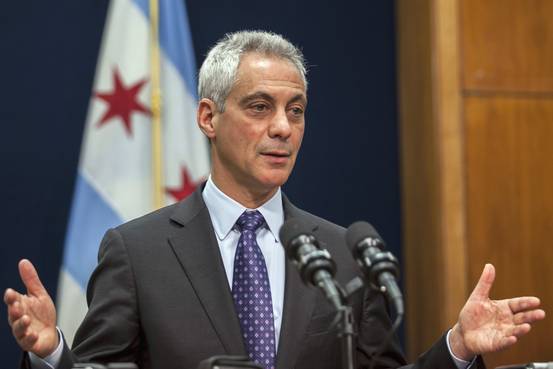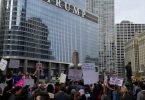Three years ago, when Rahm Emanuel was laboring to survive a mayoral runoff election with Cook County Commissioner Jesus “Chuy” Garcia, he deployed a classic rescue device for a pol in trouble. That would be the mea culpa, which in his case was a TV ad featuring a dewy-eyed Emanuel in a pullover sweater conceding, “I can rub people the wrong way.”
It worked—with the help of several million dollars. This time, Emanuel needs a different tactic if he’s going to win a third term as Chicago mayor by prevailing against the likes of ex-top cop Garry McCarthy, former Chicago Public Schools chief Paul Vallas and ousted school principal Troy LaRaviere, all of whom are eager to dine on his liver with or without Chianti.
My advice to hizzoner: Lose the fuzzy sweater. Take a page from Donald Trump’s book of political sincerity and let out your inner, um, jerk. In other words, campaign as what you are: a foul-mouthed SOB who can and has delivered for a city that needs one.
Now, not everyone will agree with my recipe for political success, or with my base assumption that Emanuel has legitimate accomplishments. Heaven knows, the man isn’t exactly shy about bragging, usually to a fault. If you look at his actual record, though, it’s real.
Take the City Council’s March 28 signoff on the $8.5 billion plan to revamp O’Hare International Airport, adding dozens of gates, tons of creature comforts that today’s flying public demands and more than 3 million square feet of terminal space—enough to reinstall O’Hare in the front ranks of the world’s leading airports.
There is no more important project for the future of this city, region and much of the nearby Midwest. None. Chicago at its core is a transportation and trading center, a grownup version of what Jean Baptiste Point du Sable and Fort Dearborn began. And it was Emanuel who named a savvy aviation commissioner in Ginger Evans, stuck by her through difficult negotiations, then put on the heat when American Airlines balked at signing. American caved. Emanuel won. So did Chicago.
Another example: the rebirth of the city’s job market, driven largely by the central area. Yes, Emanuel foes carp that downtown isn’t a real neighborhood, that we need to shake down those rich people via a LaSalle Street tax, a head tax or some other racket. Yet Chicago, all of Chicago, now is home to more private-sector jobs than it has had in a quarter of a century.Most of the growth has been downtown, and most of it has been since Emanuel took office in 2011 and adopted a strategy heavy on attracting corporate offices. That’s remarkable in a state that, except for Chicago, is mired in a deep rut. So let’s keep the cow healthy, milk it when we can, and work to deliver a few more calves for outer neighborhoods.
Example three: city finances, which are the key to everything; without money, government ultimately can’t do squat, regardless of what the far left says. For almost a quarter of a century, Mayor Richard M. Daley ignored the city’s spiraling pension debt. Emanuel has dealt with it. It took him a while to get started, as he first tried working things out with the unions. But when the courts balked, Emanuel bit the bullet and spent his political capital to raise taxes. In Daley’s last year, the city contributed $476.3 million to its four pension funds. This year, the city has budgeted $1.19 billion. We’re not solvent yet. But we’re infinitely closer.
Crime remains a problem, though the staggering homicide rate finally is dropping. Schools are a problem, too. But since World War II, when has CPS not been a problem?
So, call those things to work on, but enough with the apologies already. If Emanuel wants to win, he needs to remind Chicagoans of what’s been accomplished by the tough-minded boss on the fifth floor of City Hall—and dare his opponents to do better. I’m ready to listen.







